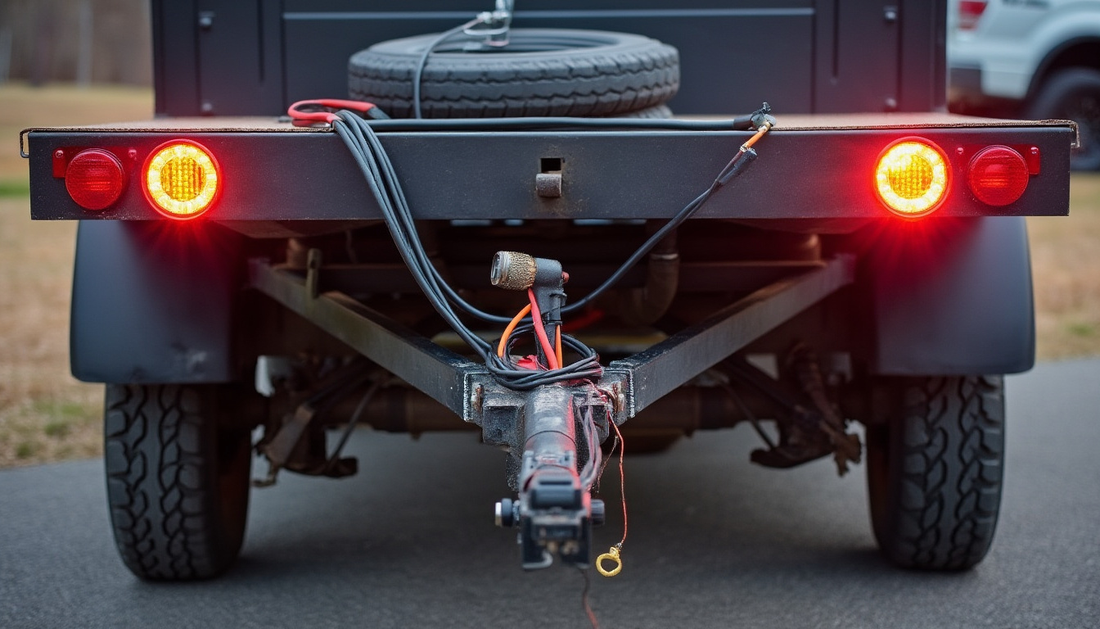
Understanding the Differences Between 4-Way and 7-Way Trailer Wiring
Share
Introduction
When it comes to trailer wiring, the differences between a 7-way system and a 4-way system can significantly impact the functionality and safety of your towing experience. Choosing the right wiring system ensures that your trailer lights work properly and, for larger trailers, enables features like electric brakes and auxiliary power. In this guide, we'll break down the main differences between 7-way and 4-way trailer wiring systems, their applications, and how to determine the best choice for your setup.
You might also find these blogs helpful:
Choose the right wire gauge for trailer wiring.
Extend trailer wiring for custom setups and long trailers.
Troubleshoot common trailer wiring issues.

4-Way Trailer Wiring
What is 4-Way Trailer Wiring?
The 4-way trailer wiring system is the most basic setup, commonly found on smaller trailers, utility trailers, and lightweight towing setups. It provides the essential lighting connections, such as brake lights, tail lights, and turn signals. These are critical for safety, ensuring that other drivers on the road are aware of your movements while towing.
A 4-way system is simple to install and maintain, making it a popular choice for trailers that don’t require any advanced electrical systems. However, it does not include wires for brakes, auxiliary power, or reverse lights, which limits its functionality in larger trailers or RVs.
When to Choose 4-Way Trailer Wiring
If you're using a small utility trailer or a lightweight trailer that doesn’t need electric brakes or extra power, the 4-way system is usually sufficient. It’s simple to install, budget-friendly, and provides the essential lighting you need for safe towing. Typical uses for 4-way wiring include:
- Small utility trailers
- Boat trailers
- Basic flatbed trailers

7-Way Trailer Wiring
What is 7-Way Trailer Wiring?
The 7-way trailer wiring system is designed for larger trailers or trailers that require more advanced electrical systems. In addition to the basic functions of brake lights, tail lights, and turn signals, the 7-way system includes additional wires for electric trailer brakes, auxiliary power, reverse lights, and battery charging.
This setup is essential for trailers that are heavier and require brakes to ensure safety. The 7-way system is more complex to install but offers a significant advantage for those towing larger trailers or needing extra electrical functions for things like powering appliances or charging a trailer battery.
When to Choose 7-Way Trailer Wiring
For larger trailers, especially those that carry heavy loads or have built-in braking systems, the 7-way system is a must. It’s ideal for:
- Travel trailers
- Horse trailers
- RVs
- Trailers with electric brakes
- Trailers needing auxiliary power
With a 7-way system, you also get the benefit of reverse lights and the ability to charge a trailer battery while towing, which is highly advantageous for extended road trips.

Comparing 4-Way vs. 7-Way Trailer Wiring
To make it easier to see the differences, here’s a comparison between 4-way and 7-way trailer wiring:
| Feature | 4-Way Wiring | 7-Way Wiring |
|---|---|---|
| Number of Connections | 4 | 7 |
| Functions Supported | Ground, tail lights, brake lights, turn signals | Ground, tail lights, brake lights, turn signals, electric brake, reverse lights, auxiliary power |
| Common Applications | Small utility trailers, boat trailers, cargo trailers | RVs, horse trailers, trailers with brakes, larger utility trailers |
Installing and Upgrading Your Trailer Wiring
When deciding whether to stick with your current trailer wiring system or upgrade, it’s essential to consider both the weight of your trailer and the electrical components you need. If you're upgrading from a 4-way system to a 7-way, you’ll need to install a new 7-way trailer connector that accommodates the additional wires for electric brakes, reverse lights, and auxiliary power. This requires replacing the 4-way plug with a round 7-way plug, which provides connections for these added functions.
You may also need to run new wiring for components like electric brakes and battery charging, which aren't included in the 4-way setup. Additionally, ensure that your tow vehicle is equipped with a compatible 7-way socket and can support the added electrical demands. If not, you may need to install a 7-way harness or use an adapter, and possibly update your vehicle’s electrical system, including a brake controller for trailers with electric brakes.

Conclusion
Choosing between 7-way and 4-way trailer wiring depends on your trailer's size, weight, and electrical needs. A 4-way system is excellent for basic lighting functions, but if your trailer requires more advanced electrical capabilities like electric brakes, auxiliary power, or reverse lights, a 7-way system is the best choice. Choosing the right system not only impacts the performance of your trailer but also enhances safety and convenience on the road.
Whether you're towing a small utility trailer or a larger, more complex setup, selecting the proper wiring ensures that all necessary functions are supported, giving you peace of mind during your travels. By understanding the differences and the specific applications of each wiring system, you can ensure a safe and functional towing experience for all your trailer needs.








